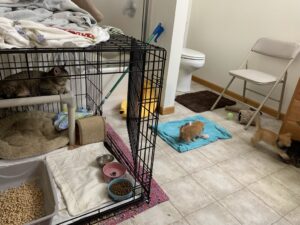Volunteer Opportunities for Foster Families
Fosters who provide temporary housing for cats and dogs who are unable to live at the shelter, allow BENCHS to provide assistance to more animals than we otherwise could. Whether it’s a litter of kittens who need time to get older, or a dog with heart-worm, being in a home is best. You could become a Foster Care home for an animal in need…the perfect opportunity to enjoy the company of a rescued shelter animal without the commitment of adoption!
BENCHS receives kittens and puppies at the shelter that are too young to be placed up for immediate adoption. We also receive cats and dogs with minor illnesses or injuries that require temporary in-home care. Fostering an animal can be a lot of work, but it provides much needed socialization and a greater chance of survival for the animal. The longest typical foster for cats/kittens is 8-9 weeks and for dogs it can be 2-3 months. If you are up to the challenge, it can be most rewarding.
Our greatest need for fosters is for kittens. Kitten season seems to happen late winter through late fall, but the May to September months are the busiest for cats and their litters. If you are interested in becoming a foster home for animals in need, then complete the foster application today!


As a foster family, you will provide a safe and loving environment while you feed, care for, and socialize your foster animal(s). You need to be able to work with your foster pets to help them learn how to behave inside a home. They need lots of love, patience, and consistency.
Your foster pets will need adequate exercise. You will need to be able to monitor the animals’ health and transport your foster(s) to and from BENCHS for medical check-ups and vaccinations on a regular basis. Our regular fosters need to live within 30 miles of the shelter for vet care, some exceptions will apply.
BENCHS staff will give you guidelines on feeding, training, and medicating. BENCHS will provide all food, litter, toys, bedding, kennels, etc. needed for fostering. All veterinary care will also be provided by BENCHS, including medications.
You will need a separate room or space to keep foster animals apart from your personal pets. Your personal pets must be spayed/neutered and current with all vaccinations and preventatives.
Animals who are not ready for adoption are in need of foster homes. They may be sick, injured, underage or not well socialized. During kitten season, we are in need of fosters for nursing moms and bottle-fed babies, a delicate age requiring 24-hour care.
It depends. BENCHS staff will decide this on a case-by-case basis for foster dogs. Their age, health, and behavior will all need to be considered. If they are allowed to socialize we do not want them to be put into potentially uncomfortable situations. Public parks, walking trails, and family outings are great places to take them to be seen by the public and meet new people, but please do not introduce them to other dogs unless you have been trained to do so. Foster dogs should never be taken to dog parks due to the possibility of disease, parasites, unvaccinated dogs, and even dog fights.
Traveling can be extremely stressful for cats and kittens so they should always stay home.
If you will be traveling, please talk to the Foster Coordinator so arrangements can be made for a temporary or new foster home for your foster pet.
That’s great! We are always looking for more fosters and will walk you through the process! We will provide training for specific tasks, like bottle-fed babies, and send you home with supplies to care for your fosters.
Afraid you won’t be able to let the animal go at the appropriate time? Saying goodbye can be hard, but knowing that BENCHS adoption staff will be finding a great home for your foster animals, and feeling great because you saved a life helps. Most importantly, remember that when you see your fosters leave, it means you’ve opened your home to saving the lives of even more animals!
However, because we know “foster fails” happen, foster families get the first opportunity to adopt their foster animals before they are listed as available on our website. Just let the Foster Coordinator know that you are interested in adopting so that we can let adoption staff know.
- Staycations allow the shelter dogs to live in a home for a weekend.
- Moms with babies need foster care until the babies are 8-9 weeks old. Mom takes care of everything until the babies are about 4 weeks old. Then during weaning, they will require 4-6 hours of daily care.
- Weaned kittens and puppies stay in foster until they are 8-9 weeks old. They require 3-4 feedings per day and a total of 4-6 hours of daily care.
- Neonates, or bottle babies, need to be fed by bottle until they are 4 weeks old. They require round the clock care for the first week or two, then daily bottle feedings every 3-4 hours during the day. After weaning, they will require 3-4 feedings per day and a total of 4-6 hours of daily care.
- Sick or injured animals may need 3-4 hours of daily care for 1 to 6 weeks.
- Fearful or under-socialized animals may need 2-6 hours of daily care for 2-4 weeks.
- Emergency foster care is sometimes needed while the Foster Coordinator is securing a foster home. Sometimes this is a matter of hours to a couple of days.
